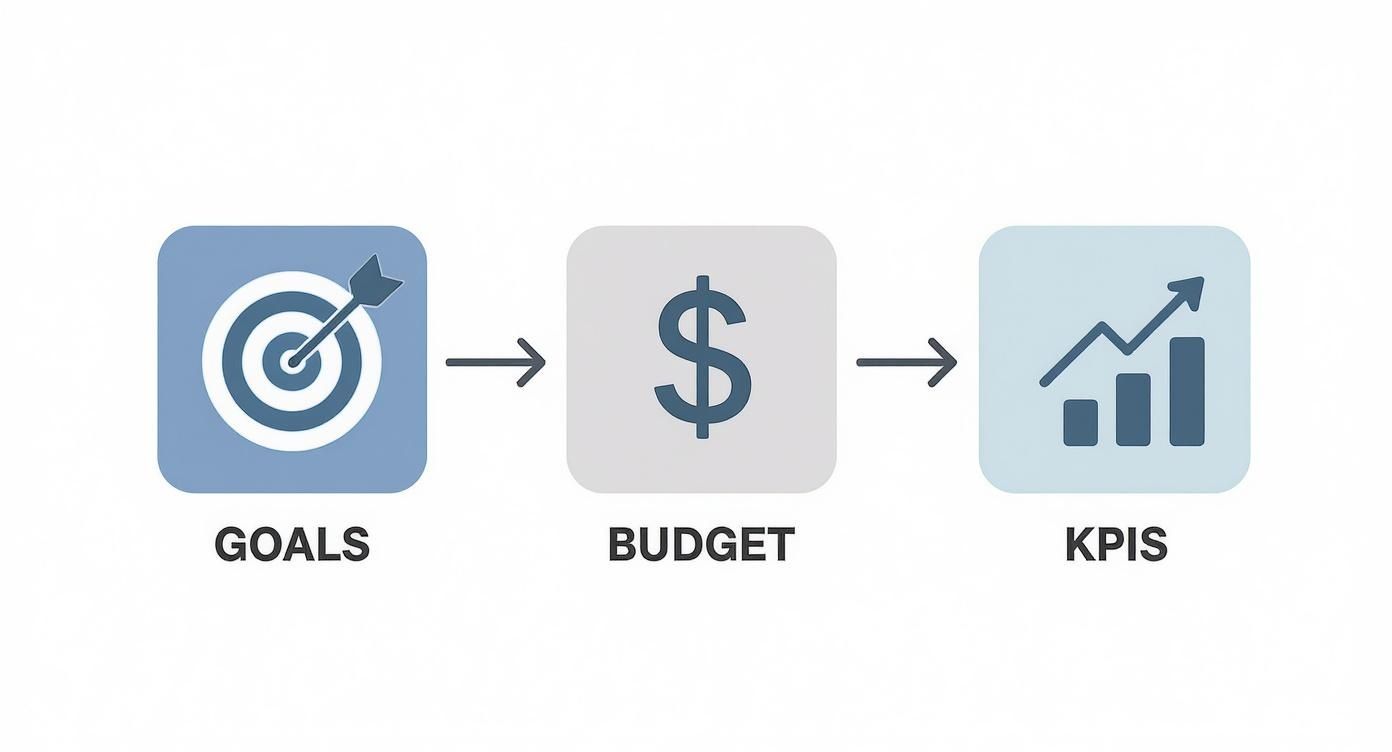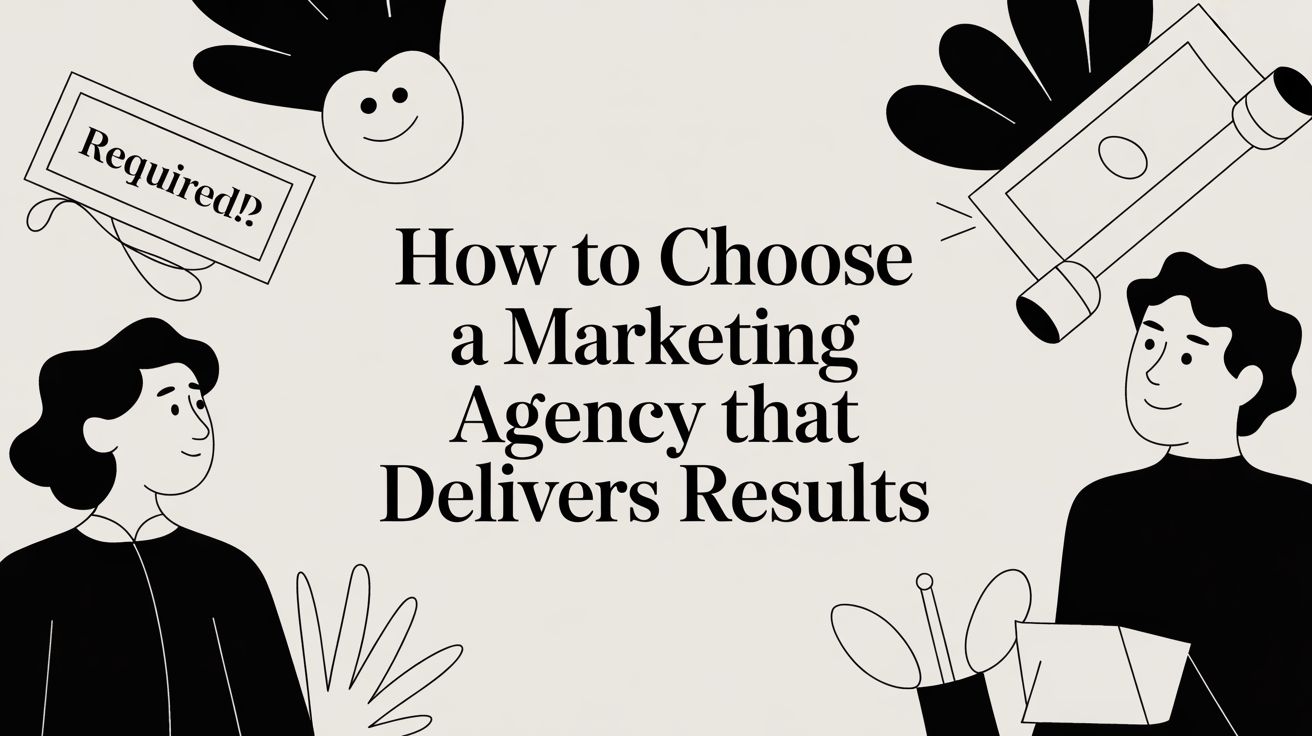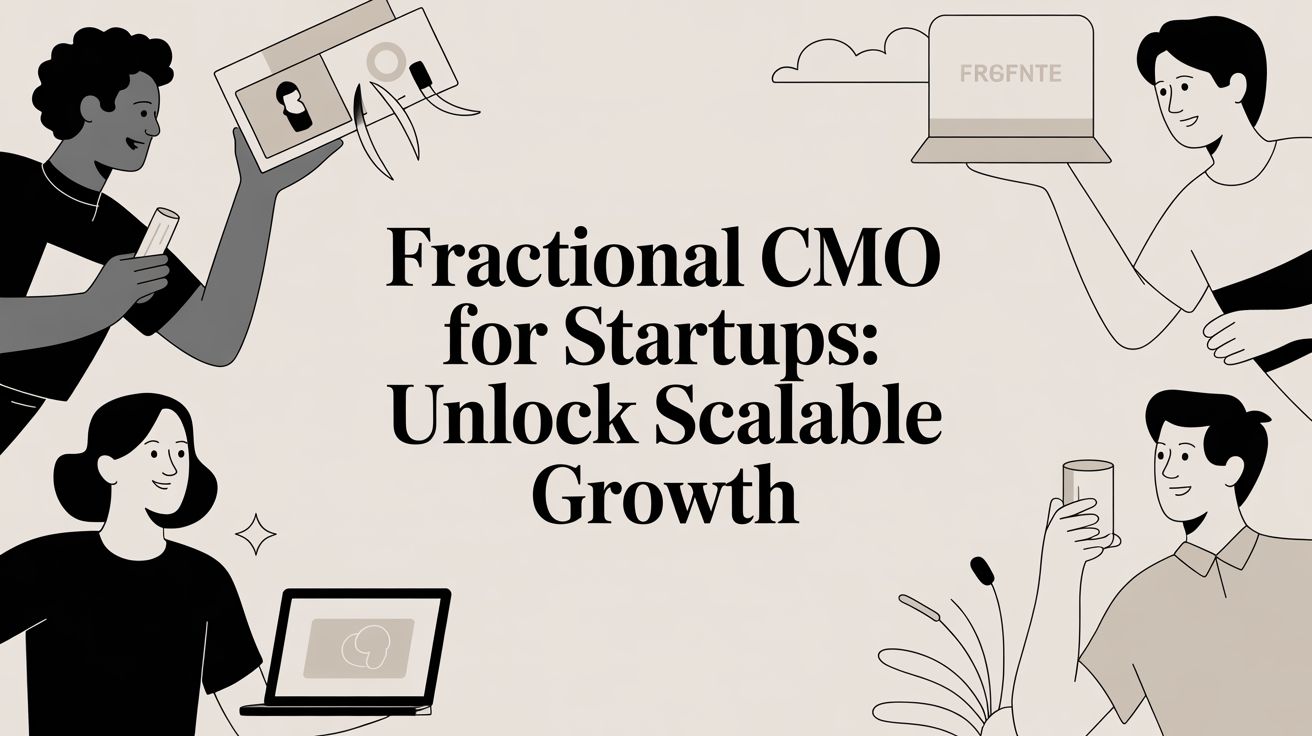Choosing a marketing agency isn't just about finding the right partner—it's about knowing what you need before you even start looking. The best agency partnerships are built on a foundation of internal clarity. Get this right, and you're halfway there.
Defining Your Goals Before Starting Your Search
Before you even think about Googling "best marketing agencies," the real work has to happen inside your own four walls.
Walking into an agency pitch without clear goals is like telling a pilot to "just fly somewhere." You'll definitely burn a lot of fuel, but you probably won't land where you need to be. If you want a real return on your investment, you have to define what success looks like first. This is the most critical step.
This isn't about marketing tactics yet. It's about business outcomes. What needle are you actually trying to move? Pouring cash into a partnership without this clarity is a recipe for mismatched expectations and a torched budget.
To make this process concrete, we've put together a checklist. Work through these questions internally before you start taking calls. This simple exercise will save you countless hours and headaches down the road.
Internal Marketing Needs Assessment Checklist
Completing this checklist gives you a powerful filter. You'll know immediately which agencies are a potential fit and which ones you can politely decline, saving everyone's time.
Pinpoint Your Primary Business Objectives
Start by defining what a "win" looks like six to twelve months from now. Vague goals like "more brand awareness" are impossible to measure and almost always lead to disappointment. You need to translate those broad ambitions into tangible business results.
Get specific with your team. Your goals might look something like this:
- Generating Qualified Leads: Is your main priority just filling the sales pipeline with marketing-qualified leads (MQLs) that your reps can actually close?
- Increasing Customer Lifetime Value (CLV): Or are you more focused on retention and getting existing customers to spend more through targeted email campaigns or loyalty programs?
- Driving Direct Revenue: For an e-commerce brand, the goal might be a straight line from marketing spend to online sales. Simple and direct.
- Improving Brand Authority: Maybe you need to become the go-to expert in a crowded market to shorten your sales cycle.
Don't mistake marketing activities for business goals. Publishing four blog posts a month is an activity. Increasing organic demo requests by 20% is a business goal. A great agency partner will be obsessed with the latter.
Establish Your Key Performance Indicators
Once you've locked in your main objective, you have to decide how you'll measure progress. Key Performance Indicators (KPIs) are the specific, non-negotiable metrics that prove you're on the right track. Without them, you have no real way to hold an agency accountable for results.
If you want to go deeper on this, check out our guide on how to implement proper analytics and multi-channel attribution.
This whole process ensures everyone—your team and your future agency—is pulling in the same direction. This visual breaks down how your goals, budget, and KPIs should all connect to form a solid foundation for your search.

Think of it this way: your budget funds the mission, the goals define the destination, and the KPIs are the instruments on the dashboard telling you if you're on course.
Specialist vs. Full-Service Agencies
With your objectives clearly defined, you can finally start thinking about the type of agency you need. Are you looking for a deep specialist or a versatile generalist?
A specialist agency is laser-focused on one or two channels, like SEO or PPC. They bring deep, nuanced expertise to the table, which is perfect if you've already identified a very specific bottleneck. For example, if you know for a fact that your only problem is converting paid traffic, a conversion rate optimization (CRO) specialist is your best bet.
A full-service agency, on the other hand, offers a whole suite of services under one roof—from content and social media to web development. This model works best for businesses that need an integrated strategy where all the channels need to work together seamlessly.
The good news is that you have more options than ever. The digital marketing agency market is massive, generating $598.58 billion and projected to hit an incredible $1,443.27 billion by 2034. That explosion in growth means there’s a ton of specialized talent out there.
Doing this internal work—defining goals, setting KPIs, and understanding your real needs—transforms your agency search from a guessing game into a strategic hunt.
Alright, you've got your internal goals dialed in. Now it's time to shift from planning to action—finding and scrutinizing potential partners to see who can actually walk the walk. This is where you separate the polished talkers from the proven performers.

This playbook isn’t about surface-level impressions. It’s a real-world method for vetting partners, starting with building a solid long list before you zero in on the true contenders.
Building Your Long List of Candidates
First things first, you need to cast a wide net to gather a diverse group of potential agencies. Don't just settle for the first page of Google results. A multi-pronged approach will help you find high-quality shops that might not have the biggest ad budgets.
- Tap Your Network for Referrals: Your best leads almost always come from people you trust. Ask founders, advisors, and mentors in your industry who they’ve worked with. More importantly, ask who they’d recommend without a moment's hesitation.
- Consult Industry Reports and Awards: Publications like Adweek, Clutch, and UpCity are goldmines. They release annual lists of top-performing agencies by specialty or location, giving you a pre-vetted pool of reputable firms.
- Perform Strategic Online Searches: Get specific. Instead of just "marketing agency," use long-tail keywords like "B2B SaaS lead generation agency" or "DTC e-commerce growth marketing for Shopify." This helps you find specialists who already get your business model.
Once you’ve got a list of 10-15 agencies, it’s time to put on your detective hat. The real vetting begins now.
How to Dissect an Agency Website
An agency’s website is its number one marketing tool. Think about it—if it’s confusing, slow, or full of vague promises, that’s a massive red flag. They need to be able to market themselves effectively before you can trust them to market you.
Look for a crystal-clear explanation of who they serve and what problems they solve. Do they have a specific industry focus? Do they specialize in a certain stage of company growth? A partner that tries to be everything to everyone often excels at nothing.
An agency’s own marketing is the first and most important case study they can show you. If their website is a mess, their content is weak, and their SEO is nonexistent, how can you trust them to handle yours?
Next, it's time to dig into their case studies and client testimonials. This is your window into what they can actually do and the results they deliver.
Authenticating Case Studies and Results
Case studies are crucial, but they aren't all created equal. A lot of agencies fill them with vanity metrics that sound impressive but have zero connection to actual business growth. Your job is to hunt for tangible outcomes.
Look for case studies that clearly outline:
- The Initial Challenge: What specific problem was the client actually facing?
- The Agency's Strategy: What was their plan of attack, and what was the thinking behind it?
- The Measurable Results: This is the most important part. You want to see hard numbers like a X% increase in MQLs, a Y% decrease in Cost Per Acquisition, or $Z in attributable revenue.
Vague statements like "increased brand awareness" or "boosted engagement" are just noise. You need proof that they can move the needle on the metrics that matter to your bottom line. To get a feel for how tangible results should look, check out some examples of our own proven marketing results for a clear benchmark.
The Agency Vetting Scorecard
To keep your evaluation process organized and objective, use a simple scorecard. This little tool is your best defense against a slick sales pitch, forcing you to compare every candidate on the same set of criteria.
This structured approach turns what can be a subjective process into a data-informed decision. It helps you quickly weed out the poor fits and pinpoint the top 3-5 agencies you want to invite for a discovery call. With this shortlist in hand, you’re ready to move to the interview stage, armed with the right questions to dig even deeper.
The Critical Interview Questions You Must Ask
This is where the rubber meets the road.
The initial discovery calls are your chance to cut through the polished sales pitches and see if you're talking to a genuine strategic partner. Your goal is to move beyond the surface-level stuff and dig into how they think, solve problems, and handle the inevitable bumps in the road.
These conversations will reveal their strategic depth, their level of accountability, and what it’s really like to work with them when a campaign isn’t hitting it out of the park.
Questions About Strategy and Process
Before you get bogged down in tactics, you need to understand their high-level thinking. A great agency sells outcomes, not just a to-do list. Their answers here will show you if they’re a true partner or just an order-taker waiting for instructions.
Start with these to gauge their strategic mindset:
- Based on our goals, what would your first 90 days look like? This question forces them to get specific about your business. A good answer is a thoughtful, phased approach. A bad answer is a generic promise to "start running ads."
- How do you differentiate between a client’s request and a strategic recommendation? This one is a crucial test. You want a partner who will respectfully push back and explain why your idea might not be the best path forward, not an agency that just says "yes" to everything.
- Walk me through your client onboarding process. A chaotic onboarding is a massive red flag for a chaotic partnership. A strong agency will have a structured, detailed plan for kicking things off, covering discovery, technical setup, and goal alignment.
Questions That Reveal Accountability
Let's be real: no agency wins 100% of the time. Every marketing plan has its ups and downs. What truly matters is how they react when a campaign underperforms. Accountability is non-negotiable.
These questions are designed to see how they handle adversity:
- Tell me about a campaign that missed its goals. What happened, what did you learn, and what did you do next? An agency that claims they’ve never failed is either brand new or not being honest. Look for humility, a clear-eyed analysis of what went wrong, and a proactive plan for how they fixed it.
- How do you handle shifting client priorities or unexpected market changes? Business is messy and unpredictable. A rigid agency will break under pressure. You need a partner who is agile enough to pivot without dropping the ball.
A top-tier agency doesn't just report on the numbers—they own them. They present both the wins and the losses with equal transparency and come to the table with solutions, not excuses.
Questions About Team and Communication
The people you talk to every day will make or break your experience. It's essential to understand who will actually be doing the work on your account and how you'll communicate. Remember, the senior person selling you the dream is rarely the one you'll work with day-to-day.
Get clarity on the human element with these questions:
- Who will be my primary point of contact, and who are the specialists executing the work? Get specific names and roles. This helps you avoid the classic bait-and-switch where a senior partner closes the deal, then hands you off to a junior account manager.
- What is your communication rhythm? Can I see a sample report? A good report tells a story with data. It connects marketing activities to real business outcomes, not just a list of vanity metrics like clicks and impressions.
- What is your philosophy on different marketing models? Understanding their take on flexible approaches, like Marketing as a Subscription versus a traditional retainer, can reveal a lot about their adaptability. It shows if they’re focused on finding the right fit for you or just pushing their preferred package.
By arming yourself with these questions, you turn the interview from a sales pitch into a genuine strategic evaluation. You’ll be able to confidently assess not just their skills, but how they truly operate as a partner.
Evaluating Proposals and Understanding Pricing Models
After the interviews, the proposals will start rolling in. This is where your decision-making gets real, and it’s easy to get overwhelmed by a stack of PDFs, each painting a slightly different picture of the future. The trick isn't just scanning for the lowest number; it's about dissecting the value and strategy behind that number.
A great proposal is a direct reflection of how well an agency listened to you. It should feel like a strategic blueprint for your business, not a generic template they fire off to every prospect. If it’s loaded with marketing buzzwords and vague promises, that’s a pretty clear sign they didn't really get your unique challenges.
Decoding Common Pricing Models
To make a smart financial decision, you need to get comfortable with the different ways agencies structure their fees. Every model has its pros and cons, and the right one for you hinges entirely on your goals, how predictable you need your budget to be, and your appetite for risk.
Let's break down the common agency pricing models you’re likely to see. I've put together a quick comparison to help you understand the tradeoffs of each approach.
Comparing Agency Pricing Models
A comparison of the most common agency pricing models, outlining the pros, cons, and best use cases for each to help businesses make an informed choice.
Each model serves a different purpose, so make sure the one you choose aligns perfectly with the nature of the work you need done and how your business operates.
Look Beyond the Price Tag
Let me be blunt: the cheapest proposal is rarely the best one. When you hire a marketing agency, you aren't just buying a to-do list of services; you're investing in a team of experts, a strategy, and a partner that should feel like an extension of your own crew.
As you compare proposals side-by-side, ask yourself these questions:
- Is the strategy actually custom? Does the plan directly address the goals and pain points you laid out, or does it feel like a generic package?
- Are the deliverables crystal clear? Vague promises like "increase brand awareness" are major red flags. Look for specifics: "publish four SEO-optimized blog posts per month" or "manage a $5,000/mo ad spend to generate 50 MQLs."
- Who is actually on the team? Does the proposal name your point of contact? Do you know which specialists will be doing the work?
This level of scrutiny is what allows you to do a true apples-to-apples comparison of the value you’re getting, not just the cost.
A proposal isn't just a price list; it's a window into an agency's strategic thinking. The best ones sell a clear, measurable outcome, not just a collection of marketing activities. They show you the how and the why, not just the what.
Spotting Red Flags in Pricing and Proposals
The proposal phase is often where you can spot potential problems before they start. The industry is growing fast—digital agency revenue growth has averaged 12% annually over the last five years. And while many agencies are transparent, with about two-thirds charging between $175-249 per hour, you have to keep an eye out for unrealistic claims. You can discover more insights about agency industry trends to help benchmark the proposals you're seeing.
Be on high alert for proposals that include:
- Guaranteed Results: No reputable agency can guarantee a #1 ranking on Google or that your post will go viral. Marketing doesn't work that way.
- Vague Scope of Work: A lack of detail on deliverables is a recipe for conflict and disappointment down the road. If it's not written down, it doesn't exist.
- Long-Term Contracts with No Exit Clause: A confident agency will be happy to earn your business month after month. Be wary of anyone trying to lock you into a 12-month contract with no way out.
Choosing a partner based on a thoughtful evaluation of their proposal—not just the price—sets the stage for a healthy, results-driven relationship that actually moves the needle for your business.
Making Your Final Decision and Onboarding Your New Partner
You’ve done the homework, sifted through the proposals, and sat through the interviews. Now you’re down to your top contender, and it’s time to make the final call. This last stretch is all about locking in the details and setting the stage for a partnership that actually works from day one.
A strong start isn’t just a nice-to-have. It’s the foundation for a collaborative and successful long-term relationship. Rushing through these final steps is a surefire way to end up with mismatched expectations and friction down the road.

Conduct Meaningful Reference Checks
Before you sign anything, you absolutely have to speak with an agency’s past and current clients. Think of this as your final, unfiltered look into what it's really like to work with them. Don't treat this like a box-checking exercise; a 15-minute phone call can reveal more than any glossy proposal ever will.
Ask the agency for two or three references, preferably from companies similar to yours in size or industry. When you get them on the phone, skip the generic stuff. You need to ask questions that get you honest, valuable feedback:
- Communication: "Can you describe their communication style? How proactive were they in bringing new ideas to the table, versus just executing tasks?"
- Handling Problems: "Tell me about a time a campaign went sideways. How did the agency handle it? What was the outcome?"
- Team Access: "Who was your day-to-day contact? Did you feel like you had access to senior strategists when you needed them?"
- The Bottom Line: "What was the single most significant impact they had on your business? Knowing what you know now, would you hire them again?"
Listen for what they don't say. Hesitation or vague answers can be just as telling as glowing praise. This final check confirms you’re not just hiring a vendor, but a partner you can trust.
Nail Down the Contract and Statement of Work
With your decision made, the focus shifts to the paperwork. The contract and Statement of Work (SOW) are the documents that will define your entire relationship, so you need to scrutinize them.
The SOW, in particular, should be incredibly specific, leaving zero room for interpretation. It must clearly outline:
- Deliverables: Exactly what will be produced (e.g., 4 long-form blog posts per month, 2 new Google Ads campaigns, 1 monthly performance report).
- Timelines: Key milestones and deadlines for the first 90 days.
- KPIs: The specific metrics that will be used to measure success (e.g., MQLs, SQLs, cost per acquisition).
- The Team: The names and roles of the people assigned to your account.
The Statement of Work is your single source of truth. A detailed SOW prevents scope creep, aligns expectations from the jump, and gives you a clear framework for holding everyone accountable.
This clarity is non-negotiable. The global advertising agencies industry was valued at $444.7 billion, with around 450,000 businesses operating worldwide. In a field this crowded, agencies are constantly trying to stand out, and a well-defined SOW ensures you get the focused, high-impact service you’re actually paying for. You can learn more about the competitive agency landscape from IBISWorld.
Lead a Productive Kickoff Meeting
The final piece of the puzzle is the kickoff meeting. This isn't just a formality—it's your first official working session and it sets the tone for everything that follows.
The goal here is simple: move from planning to action. A solid kickoff agenda should cover:
- Introductions: Make sure everyone from both teams knows who’s who and what their role is.
- Goal Re-Alignment: Reiterate the primary business objectives and KPIs one last time. Get everyone nodding in agreement.
- Process & Tools: Sort out the plumbing. Establish communication channels (Slack, email), meeting cadences, and access to necessary tools (Google Analytics, your CMS, etc.).
- The First 30 Days: Map out the immediate priorities and next steps so the agency can hit the ground running.
By carefully managing these final steps—from reference checks to the kickoff meeting—you build a rock-solid foundation. This deliberate approach ensures your new partnership starts with clarity, alignment, and momentum from day one.
Common Questions Before You Sign the Dotted Line
Even with a scorecard and a solid process, making that final call on a marketing agency can feel like you're defusing a bomb. You’ve done the hard work, but those last-minute "what ifs" are completely normal. Let's tackle them head-on.
These are the real-world questions that pop up right before a partnership begins. Getting clear answers here is the final gut check before you commit.
What Are the Biggest Red Flags to Watch Out For?
Spotting red flags early can save you from a world of hurt. A slick sales pitch can be tempting, but a few warning signs should give you serious pause.
Keep your eyes peeled for these classics:
- Guaranteed Results: If you hear phrases like "guaranteed #1 ranking on Google" or promises of viral fame, run. Real marketing pros know that results depend on dozens of factors, many outside their direct control. Confidence is great. Impossible promises are a massive red flag.
- Lack of Transparency: Vague answers about their process, reporting, or who exactly will be working on your account are a problem. You have every right to know their methodology and the actual people you'll be partnering with day-to-day.
- Poor Communication: Pay close attention to how they communicate during the sales process. If they're slow to respond, unclear, or just bad listeners now, don't expect a magical transformation once they have your money. What you see is what you'll get.
- One-Size-Fits-All Solutions: An agency that doesn’t dig deep into your specific business goals, audience, and challenges is probably just selling a pre-packaged template. You need a strategy built for you, not one where you're just another cog in their machine.
The biggest red flag of all? An agency that sells activities, not outcomes. If their pitch is all about the "stuff" they'll do—like "four blog posts a month"—instead of the business results they'll drive, their focus is on their to-do list, not your growth.
Should I Choose a Large Agency or a Boutique Agency?
This is the classic dilemma, and there's no single right answer. It comes down to your needs, your budget, and the kind of relationship you want.
Big, well-known agencies bring a ton of resources to the table. They have a deep bench of specialists for every channel imaginable and experience with huge enterprise clients. The risk? If you're not one of their biggest accounts, you might not get the A-team. You could easily be passed to a junior team, with the senior folks only showing up for quarterly check-ins.
Smaller boutique agencies, on the other hand, usually offer direct, hands-on access to their senior strategists and founders. They're often more nimble, flexible, and have deep expertise in a specific industry or niche. The trade-off is they might have fewer services in-house and may lean on contractors for certain specialties.
Think about what matters most. Do you need a global brand with a massive toolkit, or do you value a tight-knit partnership with direct access to the experts?
How Long Should I Wait to See Results?
This is probably the most important question you can ask, and the only right answer is: it depends on the channel. A good agency will set crystal-clear, realistic expectations for every tactic they propose. Vague promises of "quick wins" are a bad sign.
Here’s a rough but realistic timeline for some common marketing efforts:
- Paid Media (PPC/Social Ads): You should start seeing traffic, impressions, and maybe some initial leads within the first 2-4 weeks. But it usually takes a full 90 days to really dial in the campaigns for consistent, profitable ROI.
- SEO & Content Marketing: This is a marathon, not a sprint. Don't expect much overnight. It typically takes a good 6-12 months to see a meaningful lift in organic traffic and leads as you build authority and your content library gains traction.
- Email Marketing & Automation: If you have an existing list, you can see results from the very first campaign. If you're building new nurturing sequences from scratch, expect to see them start bearing fruit within 1-2 months as new subscribers flow through.
A trustworthy partner will give you a detailed roadmap with both short-term milestones (30-90 days) and long-term KPIs. This ensures you can track progress and understand the value you're getting every step of the way.
Ready to stop vetting agencies and start scaling your revenue? T Minus Studios provides founders with a dedicated fractional CMO, backed by a full-stack marketing team that executes on demand. It's the strategic leadership and expert execution you need, without the overhead. Book a call to discuss your growth strategy today.
Checkout our latest posts
Our point of view, thoughts & musings on business, marketing, personal development, startups, and more.





